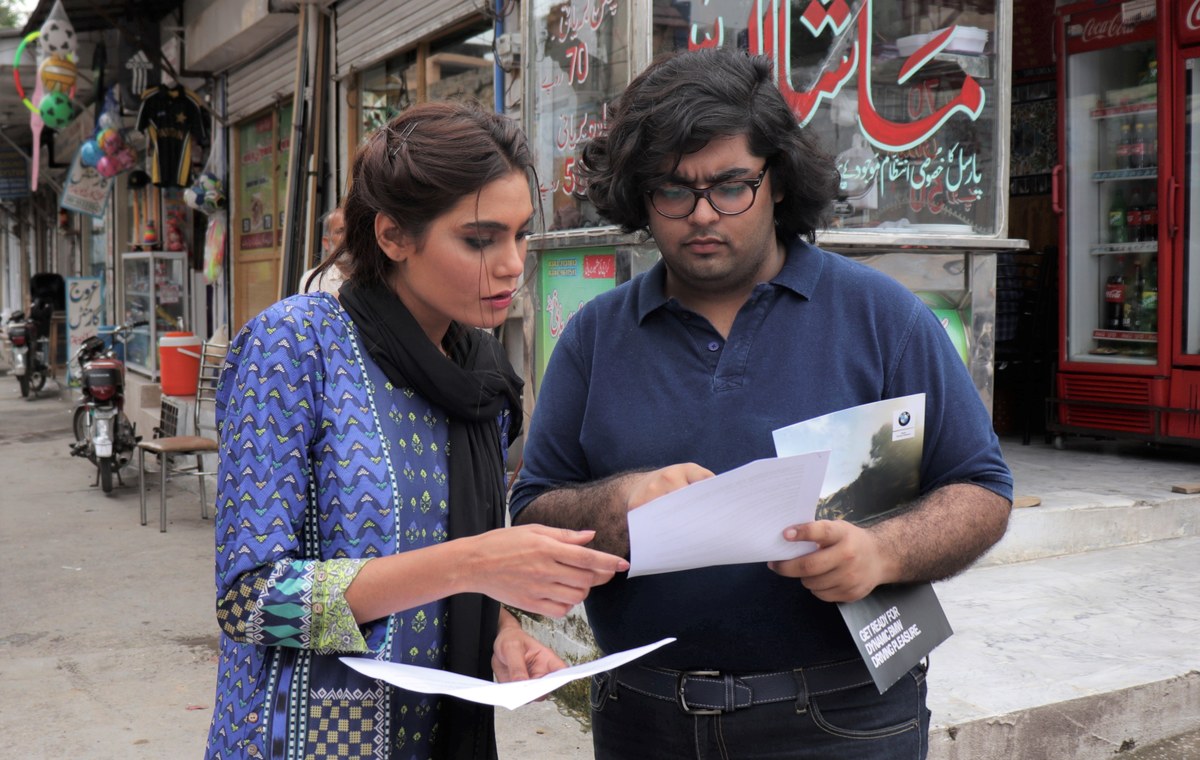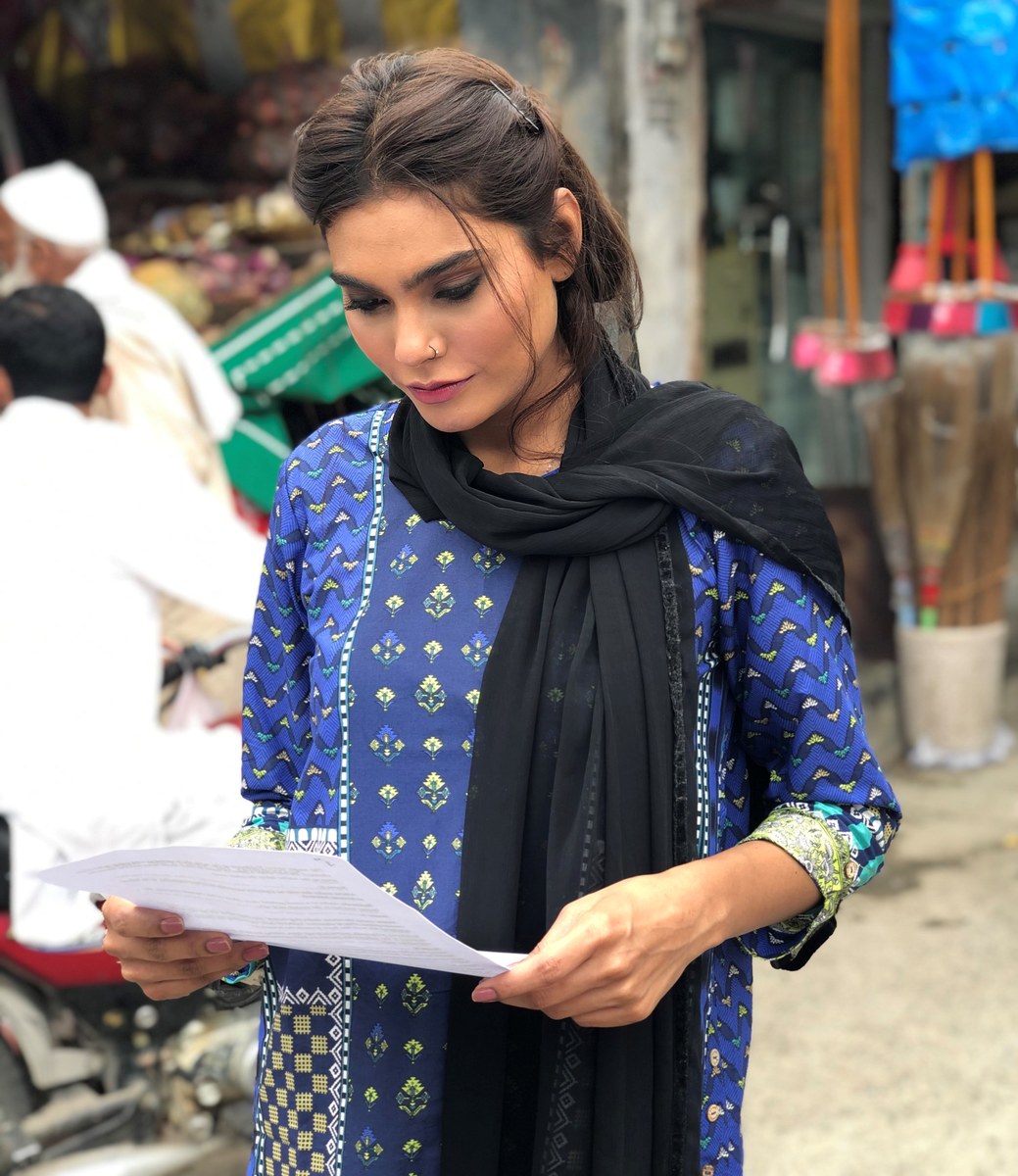KARACHI: Pakistan was already struggling with the COVID-19 pandemic when a PIA plane crash in this seaside metropolis claimed 97 lives on Friday.
Zara Abid, a 28-year-old model and actor who was coming to Karachi from Lahore in the special Eid flight to celebrate the festivity with her family, was among the victims of the tragedy.
A few days after her demise, Abid’s debut film, Sikka (coin), was released on Qissa Nagri, a YouTube channel. It summed up the story of two women who are quite different from each other, though they are both in pursuit of happiness. The deceased actor played a dual role in the movie that also benefitted from Saba Qamar’s beautiful monologue narration.
The film was shot last year in Islamabad by a young journalist and filmmaker, Ahmed Sarym.

In this undated file photo, Zara Abid can be seen with Ahmed Sarym in Islamabad during the shoot of her film, Sikka. The movie was released only a few days after Abid's tragic demise in a PIA plane crash in Karachi. (Photo Courtesy: Ahmed Sarym)
Elaborating the idea of the movie, Sarym said: “I started working on it and realized that I wanted to turn it into a short film. I had been an active journalist for about five years and wanted to get into filmmaking. Sikka was my way of describing what brought human beings together beyond social strata and worldly appearances. It was an attempt to show that we are all different sides of the same coin.”
Asked why Sarym cast Zara to play the dual role, he said: “I had approached several actresses to play the role. However, it was logistically not possible for them to travel to Islamabad. I didn’t know Zara before this, but I left her a message on Facebook and she loved the idea and decided to fly down to film with us – all on her own expense. In all honesty, it was meant to be and she was an absolute angel.”
Sarym recalls that working with Zara was like a dream. “She was unbelievably cooperative and hardworking and gave the film her absolute best. We spent hours discussing her characters, and I explained how I wanted her to approach them. She truly brought my vision to life, and I couldn’t ever thank her enough for that.”
As a person, she was different from the rest, he said.

In this undated file photo, Zara Abid can be seen with her fellow co-star, Ahmad Taha Ghani, during the shoot of her film, Sikka. (Photo Courtesy: Ahmad Taha Ghani)
“She had the most infectious laugh and was very generous and giving. In all honesty, there can be nobody quite like her. Zara’s demise has left me with a broken heart,” he added.
Sarym said they had developed a great working relationship and he wanted to cast her in his future films as well.
Talking to Arab News, Pakistan’s iconic star, Saba Qamar, said she was deeply devastated by the news of Abid’s death, though she did not get a chance to meet her while the film was made. Qamar said she always supported young filmmakers who wanted to make good movies and encouraged them to step into the field. This was also the reason why she decided to help Sarym with the monologue.
Sharing his memories, Ahmad Taha Ghani, who worked with Abid as her co-star, said: “I met her first time on the day of the shoot. I found her to be a very genuine human being. She was a strong woman who knew what she wanted. At the same time, she was a humble, grounded and down-to-earth individual who was accessible and easy to communicate with.”

This undated file photo shows Zara Abid with Neha Laaj, the producer of "Chaudhary," in Karachi. (Photo Courtesy: Neha Laaj)
Taha, an Islamabad-based actor, who started his career in the film industry in 2017 by playing the role of an aviation pilot in “Yalghaar,” praised Abid for her potential as an actor.
“She had the ability to mold herself and fit into any character,” he said. “Zara was capable of playing different and diverse roles.”
“I thought that she was a very good professional. Unlike many other actors, she did not throw tantrums and was passionate about her work. She also cooperated with all team members,” he added.

In this undated file photo, Zara Abid can be seen on the set of her film, Sikka, in Islamabad. (Photo Courtesy: Ahmed Sarym)
Few people know, however, that Sikka was not Abid’s first movie. She also played the role of a university student in “Chaudhry,” a feature film based on the life of Chaudhry Aslam Khan, a Sindh police officer who was assassinated in Karachi by militants in January 2014.
Neha Laaj, the producer of Chaudhry, said that some work on the film was pending due to the lockdown, though her team was planning to resume its activities immediately after Eid Al-Fitr.
“Zara was supposed to start her shoot from today, 27th of May, and we were hoping to film her role in the next four to five days. We wanted to shoot some clips of her song and a crucial scene in the movie,” she said.
Laaj has now decided to sign another actor for the role, though the film will pay tribute to Abid and include some of her recordings as well.
“Zara was enthusiastic about her role in the film,” she said, “and was adamant to choose acting as a career. That is why I inducted her in acting classes.”
“She gave the project a lot of time,” she added, “and I will always have fond memories of her.”















